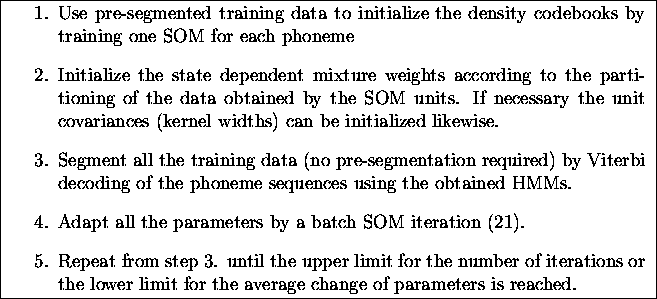



Next: Convergence.
Up: Segmental SOM training
Previous: Segmental SOM training
for producing ordered density codebooks and
maintaining the ordering throughout the training
by the segmental SOM training
occurs in the following steps:
(This can be compared to Figure 3.)

A batch iteration by the segmental SOM produces new mean vectors
 for Gaussian kernels
for Gaussian kernels
 of mixture density codebook j,
by computing the averages of the associated sample vectors
of mixture density codebook j,
by computing the averages of the associated sample vectors  :
:
|  |
(20) |
where the indicator function  ,
if qt (the decoded state for time t)
is connected to the codebook j (otherwise
,
if qt (the decoded state for time t)
is connected to the codebook j (otherwise  ).
In general, each state could use several codebooks and
the same codebooks can be connected to several states.
Here, the states in the same HMM use the same codebook
(see Figure 1).
The most probable correct state sequences q
corresponding to the observation sequences
).
In general, each state could use several codebooks and
the same codebooks can be connected to several states.
Here, the states in the same HMM use the same codebook
(see Figure 1).
The most probable correct state sequences q
corresponding to the observation sequences  are determined by the current segmentation (see Figure 3).
The equation (21) is essentially the same as (3).
If individual covariance matrices would be needed for each Gaussian kernel,
the adaptation formula for
are determined by the current segmentation (see Figure 3).
The equation (21) is essentially the same as (3).
If individual covariance matrices would be needed for each Gaussian kernel,
the adaptation formula for  corresponding to (21)
could be obtained
by substituting
corresponding to (21)
could be obtained
by substituting  in (21)
by the matrix of the deviations from the mean vector
in (21)
by the matrix of the deviations from the mean vector
 .
.
The mixture weights that connect individual Gaussian kernels to
the output density function of an HMM state
(20) are set
in the batch iteration to reflect the contribution of the kernels
for the output density function of that state:
| ![\begin{displaymath}
\hat c_{im} = \frac {\sum_{t=1}^{T} \delta(q_t,i) h_{o,m} }
{\sum_{t=1}^{T} [\delta(q_t,i) \sum_{m=1}^{M_i} h_{o,m}]} \:,\end{displaymath}](img80.gif) |
(21) |
where the indicator function  ,
here, if the state qt = i (otherwise
,
here, if the state qt = i (otherwise  ).
The neighborhood function ho,m > 0,
if the unit m belongs to the neighborhood
of the best-matching unit o of the current codebook
(thus ho,m depends on t via the index o).
From the different kinds of neighborhood functions ho,m
[Kohonen, 1995],
the simple bubble type is used here for simplicity.
After each new adaptation of
).
The neighborhood function ho,m > 0,
if the unit m belongs to the neighborhood
of the best-matching unit o of the current codebook
(thus ho,m depends on t via the index o).
From the different kinds of neighborhood functions ho,m
[Kohonen, 1995],
the simple bubble type is used here for simplicity.
After each new adaptation of  s and cims
the size of the adaptation neighborhood is decreased gradually
until it is empty,
and then the process continues by adapting only the parameters
of the best-matching mixture for each training sample.
s and cims
the size of the adaptation neighborhood is decreased gradually
until it is empty,
and then the process continues by adapting only the parameters
of the best-matching mixture for each training sample.




Next: Convergence.
Up: Segmental SOM training
Previous: Segmental SOM training
Mikko Kurimo
11/7/1997


![]() for Gaussian kernels
for Gaussian kernels
![]() of mixture density codebook j,
by computing the averages of the associated sample vectors
of mixture density codebook j,
by computing the averages of the associated sample vectors ![]() :
:

![\begin{displaymath}
\hat c_{im} = \frac {\sum_{t=1}^{T} \delta(q_t,i) h_{o,m} }
{\sum_{t=1}^{T} [\delta(q_t,i) \sum_{m=1}^{M_i} h_{o,m}]} \:,\end{displaymath}](img80.gif)